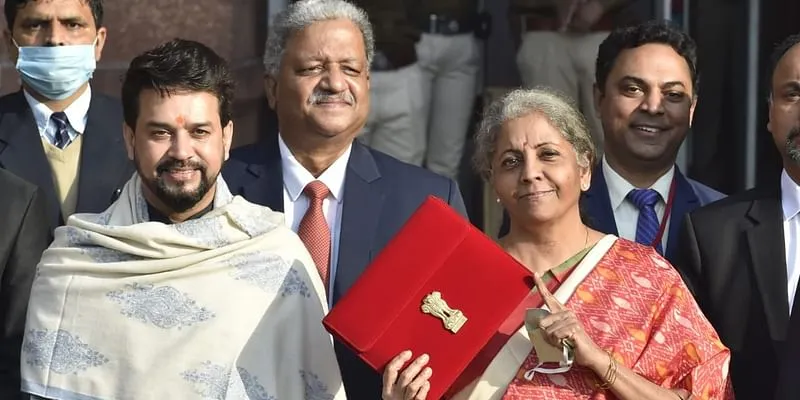Budget 2021: Edtech startups welcome focus on schools, training programmes; lament the lack of 'adequate' funds, GST cuts
Education was one of the focus areas in Budget 2021, but edtech startups expected more fund allocations, reduction in GST, and other special provisions for the sector. Here's what the industry is saying.
Education was in focus in the Union Budget 2021-22, with Finance Minister Nirmala Sitharaman detailing various programmes and initiatives for the sector.
From drawing up the legislation for a Higher Education Commission of India to setting up a Central University in Leh to strengthening 15,000 schools and creating sainik schools as part of the National Education Policy (NEP 2020) implementation plan to the government's proposed amendments to the Apprenticeship Act and the Rs 3,000-crore corpus allocated for it — most education-related announcements in the Budget have been dubbed "welcome" moves by startups.
However, many believe that Budget 2021 missed the opportunity to make big-ticket announcements (GST cuts, etc.), "adequate" fund allocation in education so as to fast-track the rollout of NEP, and other incentives critical to boost a pandemic-hit economy.
Here are the post-Budget reactions of India's top education companies.

Mayank Kumar, Co-Founder and MD, upGrad
"Following the pandemic, the importance of enhancing professional skills to stay relevant in the job sphere has become rather essential. For the same, the government’s plans to implement the Higher Education Commission of India with an umbrella body for standard-setting, accreditation, regulation, and funding is a significant move.
As part of NEP, academic collaborations with foreign higher educational institutions to regulate and permit dual degrees, joint degrees, and other such mechanisms are also being incorporated. This is a remarkable move. It also aligns with upGrad's vision where we aim to enable offline institutions to provide online degrees, leveraging our digital capabilities.”
Mohan Lakhamraju, Founder & CEO, Great Learning
“We welcome the allocation of Rs 3,000 crore towards realignment of the existing scheme of National Apprenticeship Training Scheme in order to provide post-education apprenticeship to engineering graduates and diploma holders. It will help create talent that is employable and equipped with the right set of skills for the industry ensuring professionals are job-ready. The move to join forces with the UAE to benchmark skill qualification and introduction of collaborative training programmes with the Japanese workforce are also steps in the right direction."

Vedantu CEO and Co-founder Vamsi Krishna
Vamsi Krishna, CEO & Co-Founder, Vedantu
"NEP 2020 has been a strategic move towards guiding the development of India’s education. To strengthen the policy further, this Union Budget is focusing on initiatives like National Digital Educational Architecture (NDEA), which will provide a diverse education ecosystem for the development of digital infrastructure, educational planning, governance and administrative activities.
"Further, I would like to see more investments and Budget allocation to go into the education sector to enhance it with more trending technologies which will make education accessible to students in the farthest corners of the country."
Krishna Kumar, Founder and CEO, Simplilearn
"The government’s decision of introducing post-education apprenticeship with an investment of over Rs 3,000 crore towards the skilling of engineering graduates, diploma holders, etc. is definitely a forward-looking proposition aligned with improving employment opportunities for students pursuing different disciplines.
"However, it would have been encouraging if the government had introduced a reduction on GST for online education services, with learners and teachers alike taking to online skilling programmes in view of the demands of the 'new normal'."
Zishaan Hayath, CEO and Founder, Toppr
"The goal to empower 15,000 schools is really promising. They can further mentor other schools in their region and help achieve NEP goals faster. With the future of education as hybrid, edtech companies can act as true allies to the government and education ecosystem as a whole. Technological interventions can multiply government investment manifold and accelerate the implementation of NEP i.e. focus on tracking and improving learning outcomes and holistic progress of students."

Zishaan Hyath, CEO and Founder, Toppr
Nikhil Barshikar, Founder and Managing Director, Imarticus Learning
“The trans-Asian partnership between India, Japan and UAE is in the pipeline, wherein workforce upskilling initiatives, and diploma and skill certification programmes will be jointly supported by the three nations. Given that Imarticus Learning has already established a presence in the UAE this year, this development is of particular interest to us, and we will pay close attention as more information comes to light."
Prateek Shukla, Co-founder and CEO, Masai School
“The Union Budget has introduced useful propositions in line with enabling a technically skilled future workforce. The government’s investment towards a robust framework, which includes the skilling and upskilling of engineering graduates, diploma holders, and an enhanced focus towards technical skilling of non-science students will aid in paving the path in creating a job-ready workforce in the 'New Normal'.
"However, it would have been advantageous if the government had introduced a GST cut from 18 percent to 5 percent for edtech products, benefiting both learners and edtech companies.”

Prateek Shukla, Co-founder and CEO, Masai School
Santanu Paul, CEO and Managing Director, TalentSprint
“The Union Budget 2021-22 has been a letdown for edtech firms which performed extremely well during the pandemic and were revenue drivers. Platforms promoting hybrid and blended learning will play a pivotal role in accelerating reach in Tier II and III towns, and the government should have taken cognisance of this and provided special incentives. Homegrown edtech firms make a tremendous contribution to the tech industry in terms of providing job-ready talent for future technologies.
"However, we welcome the announcement of collaborative training and inter-training programmes between India and Japan to facilitate the transfer of Japanese vocational and industrial skills, and the partnership with UAE to benchmark skilled qualifications. We expect such initiatives will be a game changer for industries."
Ankush Singla, Co-founder, Coding Ninjas
"The government's move under NEP for 2021, from opening up of new schools to collaborating with Japan over technology and knowledge sharing is a great decision.
"While the NEP unlocks great opportunities for private players in the edtech space and collaboration opportunities with the government, it would be interesting to see the implementation and fast-tracking of these regulations for the education system to boom. The tax holiday and capital exemption are welcome moves. It is a relief to startups, especially who were impacted by the pandemic and the lockdown."

Founding team of Coding Ninjas
Aakash Chaudhry, MD, Aakash Educational Services Limited (AESL)
"The FM has given a big boost to the implementation of NEP 2020 with several measures. Notable among them is the creation of an 'umbrella' structure for central higher education institutions in various cities. This will go a long way in creating standards, monitoring, and ensuring quality of pedagogy in higher education in the country. The government has demonstrated its commitment to qualitatively strengthen over 15,000 schools as proposed in NEP 2020."
"The announcement to set up 750 Eklavya schools will no doubt speed up the mainstreaming of children from tribal communities, which is the need of the hour. Budget 2021 is opening a new chapter in India’s education system and we welcome it wholeheartedly."
Sandeep Wirkhare, MD & CEO, Indian School Finance Company
“The education sector would have expected higher allocation or specific measures for schools and education infra financing institutions given the pandemic overhang, but setting up 15,000 model schools under NEP is positive and will go a long way in channelising energies in desired direction to enhance quality in education."
Prajodh Rajan, Co-Founder & Group CEO, EuroKids International
“The education sector has found a prominent place in this year’s Union Budget, given the large scale impact the pandemic has had on it. With an aim to move India towards an Aatmanirbhar Bharat, this year the focus is on rolling out the NEP and its elements across schools. The digital-first mindset will take blended learning further so that students can continue their learning paths. Teacher training and a toy based learning pedagogy will help strengthen the sector and take us ahead on the learning curve.”

Prajodh Rajan, Co-founder & Group CEO, EuroKids
Kartik Sharma, Co-Founder, DcodeAI
"The government's continued efforts to boost the excellence of education in India is greatly appreciated. With a focus on education for all, providing quality education through NEP 2020, collaboration with Japan for the sharing of technology and knowledge, skilling youth and launch of data analytics, artificial intelligence, and machine learning, the government has rolled out incentives to provide impetus to the activities and subsequently to the growth of edtech and skill-tech enterprises."
Vivek Prakash, Co-founder, Codingal
"The relief in tax and compliances for startups as proposed in this Budget points towards the government’s intent to promote and nurture the Indian startup ecosystem, and augurs well for both entrepreneurs and investors. This is practically an exhortation by the government to Indian entrepreneurs to make in India, for the world."
Narayanan Ramaswamy, Partner and Sector Head – Education and Skill Development, KPMG in India
“COVID-19 had created an unprecedented situation in the education sector. While it was a ”washout year” for many students, it also helped in an overall acceptance of digital technologies in learning, teaching, assessment, administration, and counselling. A transformational policy in NEP got announced during this year. In my view, this Budget has not seized this opportunity to use this momentum to drive transformation. NEP implementation required huge financial support and the Budget has completely ignored it – save some bright spots few and far in between.
"Overall, while there is some good news, in a year where the allocation to education should have been increased and many initiatives regarding NEP should have been funded adequately, the allocation has reduced by 6.13 percent to our disappointment. This could well be a great opportunity missed to give the much needed impetus to the forward-looking NEP and accelerate the relevance of Indian talent in the global arena."
For YourStory's multimedia coverage of Budget 2021, visit YourStory's Budget 2021 page or budget.yourstory.com

Edited by Teja Lele









